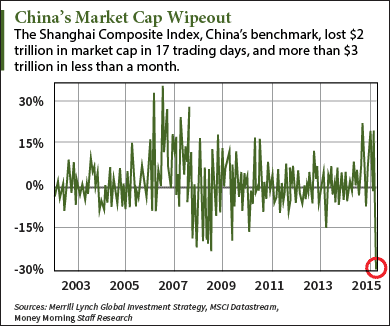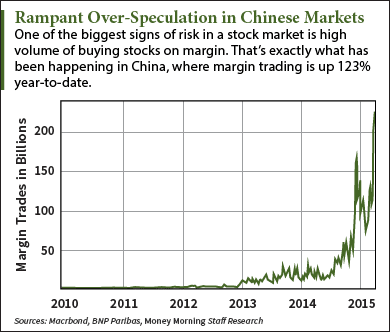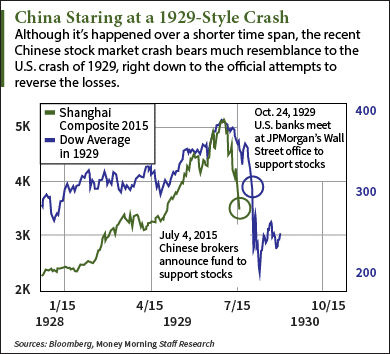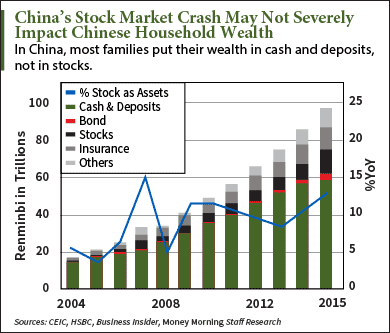 While much of the world's focus has been on the crisis in Greece, China's stock market crash brewing to the east is more likely to ripple global markets. Value of shares in the world's largest economy plummeted more than 30% in the last few weeks alone, after having skyrocketed 150% in little more than a year.
While much of the world's focus has been on the crisis in Greece, China's stock market crash brewing to the east is more likely to ripple global markets. Value of shares in the world's largest economy plummeted more than 30% in the last few weeks alone, after having skyrocketed 150% in little more than a year.
China's benchmark Shanghai Composite Index began its breathtaking freefall after a June 12 high of 5,178. In under a month, the "blue-chip" stocks listed on the Shanghai had crashed 32% by July 8. The Shenzhen Stock Exchange, where some big and mostly middle-market company stocks are traded, fell nearly 30%. And the third principal Chinese stock market, the ChiNext Index (known as "China's Nasdaq"), lost 42% of its value in 21 days.
Last week, Chinese government intervention sparked a short-term rally. Over three trading days ending July 13, the Shanghai Composite Index recovered 13.1%. Here are a few ways the government stepped in:
- It froze nearly half of all share listings. That's more than 1,200 of 2,808 listed issues for a total market cap of roughly $2.2 trillion.
- It temporarily barred initial public offerings (IPOs).
- It lent 260 billion yuan ($42 billion) to 21 brokerage firms so they can purchase stocks.
- It announced a new 250 billion yuan ($40 billion) stimulus package.
The big question is whether China's stock market rout will continue once its government repeals these stabilization measures...
"Things are so bad that even Chinese regulators are reporting that this is the largest wave of trading halts in the history of that country's equity markets. Given that China's bureaucrats are notorious for publishing only sunshine accounts of what's happening there, that's a serious development," Money Morning Chief Investment Strategist Keith Fitz-Gerald told readers on July 11. "Hundreds of millions of inexperienced Chinese investors, many of whom have never owned securities before and who have never experienced anything other than rising markets, are panicking. Effectively, they've all hit the sell button at once."
Exactly how bad is China's stock market crash? These four charts help put the country's major market sell-off into perspective...
China Stock Market Crash Chart No. 1: $3 Trillion Market Cap Evisceration
More than $3 trillion in share value has evaporated from Chinese markets since mid-June.
"The Shanghai and Shenzhen bourses have lost more than $3 trillion in market capitalization between them over the past three weeks - a real money amount that's greater than Brazil's annual output or Spain's entire stock market," Fitz-Gerald told readers on July 11.
China Stock Market Crash Chart No. 2: Margin Buying a Red Flag for Risk
Margin buying - speculating on the stock exchange using borrowed money - has increased five-fold in China over the past year to 2.3 trillion yuan ($370 billion) as of June 18, according to Macquarie Research. That means margin debt in the country has reached 8.5% of the value of all its tradeable shares. By comparison, that ratio was just 4.6% during the peak of the Taiwan Stock Market Bubble in the late 1980s.
Additionally, new investors have opened an unprecedented number of stock accounts this year. According to Macquarie, 33 million new brokerage accounts opened from January to May.
Once signs of a sell-off became apparent, emotions took over and led to the present stock market crash.
"Chinese money managers are simply dumping holdings related to the excess margin they've got on the books," Fitz-Gerald said. "The bottom line here is that the Chinese market correction is as long overdue as it is logical, especially when you understand the reasons behind it. It will continue until excess leverage is either priced out of the system or stocks are 'sold' down to where value takes over and margin does not apply."
China Stock Market Crash Chart No. 3: Scary Comparison to the 1929 Crash
"For students of history, the China stock market crash looks eerily familiar," Money Morning Contributing Writer David Zeiler wrote on July 9. "It's playing out much like the Wall Street stock market crash of 1929."
You see, both have prominently featured failed interventions.
Back in 1929, it was the big bankers of Wall Street that tried to stop the bleeding.
[epom key="ddec3ef33420ef7c9964a4695c349764" redirect="" sourceid="" imported="false"]
"The top names of the day - Morgan Bank, Chase National Bank, and National City Bank - pooled their resources and tried to prop up the market by buying shares of blue-chip stocks such as United States Steel Corp. (NYSE: X)," Zeiler wrote. "But the strategy could not overcome the wave of selling, which eventually dropped the DJIA 89% from its peak."
Similarly, the Chinese government has done just about everything it can think of to halt the Chinese stock market crash.
What's more, an influx of new, financially unsophisticated investors fueled the soaring U.S. stock market of the 1920s. They saw rising numbers as an opportunity for quick and easy profits.
"That's exactly what's happened in China over the past year or so," Zeiler wrote. "Making matters worse is that these inexperienced Chinese investors tend to follow a herd mentality."
China Stock Market Crash Chart No. 4: Effect on Chinese Households
The actual effect of China's 32% stock market plunge on the Chinese people could be less than one might expect.
"The stock market wealth effect in China is smaller than many assume, as stocks represent less than 15% of household financial assets and equity issuance accounts for less than 5% of total social financing," HSBC Chief Economist for Greater China Qu Hongbin wrote in a July 7 note to clients.
He said that for the average household, consumption growth is driven primarily by income growth, not changes in wealth. Additionally, most households put their wealth in cash and deposits - not in stocks.
Watch the video for an explanation of China's stock market crash, plus how investors can protect themselves – and even profit – from these events…
Tweet the author @TaraKateClarke, or leave a comment on Money Morning's Facebook page.
How to Play China's Stock Market Crash: China's markets are only a small part of the powerhouse that is the Chinese economy. Even though it seems like all hell is breaking loose there now, there's more going on than what makes the headlines. Here's what you need to know...






